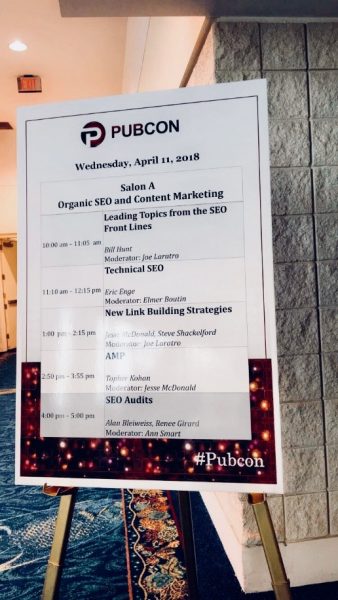I had the privilege to speak on Forensic SEO Audits with Alan Bleiweiss at Pubcon Florida in April. Besides Alan’s and my session, there were three other outstanding SEO presentations that I was fortunate enough to attend. Check out the key takeaways and recaps on SEO Auditing, Google’s Mobile-First Indexing, Local SEO, and Entity Optimization below.

Forensic SEO Auditing
“Auditing and critical thinking are integral.” – Alan Bleiweiss
Click here to download my session’s slides.
Takeaways
- Require an intake form or discovery interview questionnaire to align with the goals of the audit
- Create audit deliverables that answer the “What? So what? Now what?”
- Alan’s QUART test for the 5 SEO Super Signals: Quality, Uniqueness, Authority, Relevance, Trust
- Don’t just look for problems. Look for missed opportunities!
Free Downloads & SEO Tools
- Tools, Chrome plugins, and resources for your next SEO audit
- Free download of the Search Visibility Matrix
- Tenon.io for website accessibility auditing
- Chrome Extension to scrape “People Also Search” phrases
Google’s Mobile-First Indexing
“There is no mobile-first index. It’s one index based on mobile-first indexing.” – Ryan Jones
Takeaways
- 60% of Google searches are done on mobile devices
- 20% of ecommerce searches start on mobile devices
- They may not end on mobile but started there
- Google has one index that has both desktop and mobile signals
- All content must be on mobile or cannot be indexed
- If you don’t have any mobile pages, Google will continue to use the desktop version
- Responsive: OK, but auditing recommended.
- Adaptive: Auditing required!
- M. or separate mobile site: You may be in trouble. Auditing required!
- If applicable, mobile-separate pages like m. will still need hreflang, rel=alternate from desktop to mobile, AMP tags, and rel=canonical
- AMP pages get special SERP inclusion like in Chrome’s People Also Read
- Google is not using the AMP site as the source of truth
- Mobile-first indexing shouldn’t have a big impact on rankings
- Google will still index desktop content but search results and cache will be based on the mobile version if it exists
- Things that are devalued on desktop will be ok for mobile as long as it’s accessible like content that isn’t visible to the user on page load
Mobile-First Auditing
- Option 1: Compare Google Search Console keyword rankings for mobile vs. desktop
- Figure out why you’re not ranking on mobile
- Option 2 (Preferred): Compare Screaming Frog reports of the number of crawled pages for mobile vs. desktop
- Visualize the data using Google Fusion Tables
National Brand – Local Presence
“Fill out all fields and categories or Google may be less likely to trust the data and reduce local visibility.” – Damon Gochneaur
Takeaways
- Use a call tracking service like Call Rail with a local area code and phone number for Google My Business (GMB)
- No 800 numbers
- Create UTM codes for GMB website link tracking and Google Posts
- Clicks from GMB are often bucketed as direct instead of organic, especially on mobile
- If you have many locations, use the location detail page instead of the homepage for the GMB website link to match the user intent
- Upload location-specific photos and high-quality videos to prevent user-uploaded photos from appearing first
- Review photos uploaded by users and flag the bad ones
- Moderate and respond to comments and the Questions & Answers
- This is not optional since the Q&A can show up prominently in the SERP and anyone can provide answers
- Flag anything inappropriate
- Turn on the chat messaging feature to allow users to send messages directly to the business
- Create GMB listing for brand new locations that haven’t yet opened and mark the hours of operation as closed until it opens
- Add schema.org markup to location detail pages
Local Link Building Ideas
- Mine competitors data for opportunities
- Local sponsorships, meetups, schools, universities, alumni associations, scholarships, churches
- Google search operators
- Internal linking = the easiest link you’ll ever build
Entity Optimization for Google & Bing
“You must be the ANSWER.” – Elmer Boutin
Takeaways
- Reputation is part of Google’s website quality score according to their Search Quality Evaluator Guidelines
- December 2017: added search speech guidelines
- Organize your digital ecosystem
- Try to avoid using microsites and subdomains
- Separate subfolders logically and using natural language your users understand
- Set up a LinkedIn profile and Wikipedia page using a credible Wikipedia editor
- Audit your Wikipedia page(s) for factual correctness and add citations
One Topic To Rule Them All
There was one particular topic that all of the above Pubcon Florida sessions had in common. The obvious theme was the importance of implementing schema.org structured data markup. This is essential for local SEO, entity optimization, and Google indexing as well as provides an opportunity for CTR-boosting rich results. This is the general consensus for SEOs and Google and no longer seen as something that’s optional.
